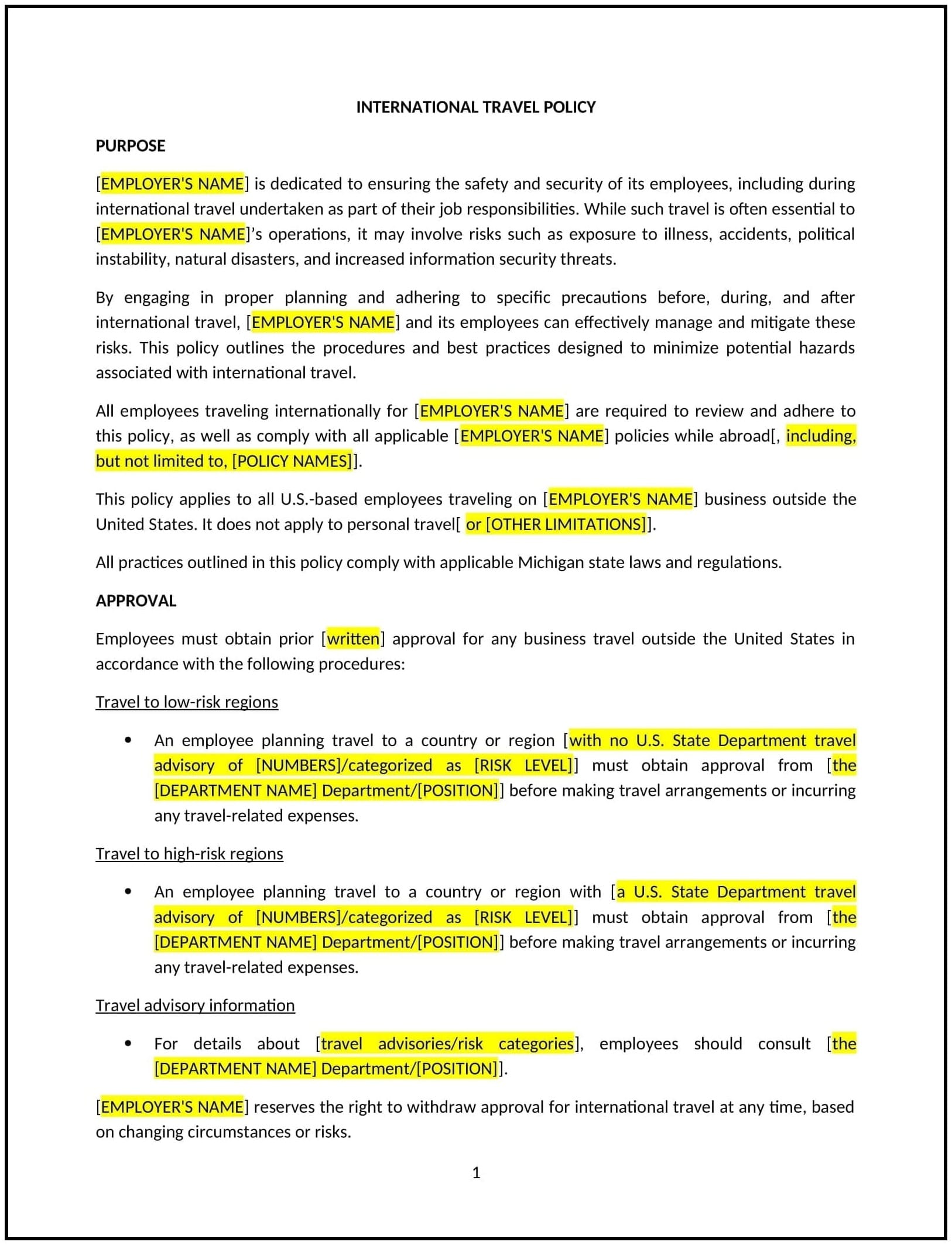International travel policy (Michigan): Free template
Got contracts to review? While you're here for policies, let Cobrief make contract review effortless—start your free review now.

Customize this template for free
International travel policy (Michigan)
An international travel policy provides Michigan businesses with guidelines for employees traveling abroad for work purposes. The policy outlines the procedures for booking, safety, expenses, and legal considerations associated with international business trips, ensuring compliance with Michigan state laws, federal regulations, and company practices.
By adopting this policy, businesses can ensure safe and efficient international travel, control costs, and comply with legal requirements, while providing employees with the necessary resources and support for travel abroad.
How to use this international travel policy (Michigan)
- Define travel approval process: Specify the steps employees must take to gain approval for international travel, including submitting travel requests, outlining the purpose of the trip, and obtaining approval from management or relevant departments.
- Set travel booking procedures: Provide clear guidelines for booking flights, accommodations, and transportation, including any preferred vendors or travel management services, to ensure consistency and cost-effectiveness.
- Address safety and health considerations: Include procedures for ensuring employee safety while traveling internationally, such as conducting risk assessments of the destination, providing safety briefings, and ensuring travel insurance is in place for medical emergencies or travel disruptions.
- Define travel expenses and reimbursement: Outline allowable travel expenses, including flights, lodging, meals, and transportation, and specify the process for submitting expense reports and receiving reimbursement. Include limits on certain expenses and procedures for receiving pre-approved funding.
- Address legal compliance: Ensure that employees traveling internationally are informed of relevant legal and regulatory requirements, such as visa or work permit requirements, customs declarations, and restrictions on certain goods or services in the destination country.
- Provide support for emergencies: Establish procedures for handling emergencies that may arise during international travel, including providing employees with emergency contact information and access to local resources or support networks.
- Set expectations for work hours and productivity: Clarify expectations regarding work hours, availability, and productivity while traveling abroad, including how to manage time zone differences and maintain communication with the home office.
- Review and update policy: Periodically review and update the international travel policy to reflect changes in travel guidelines, regulations, or business needs, ensuring that it remains effective and relevant.
Benefits of using this international travel policy (Michigan)
This policy provides several key benefits for Michigan businesses:
- Ensures consistency and efficiency: A clear international travel policy ensures that all employees follow consistent procedures, leading to efficient and organized travel management across the business.
- Controls travel costs: By setting guidelines for travel expenses and offering pre-approved vendors, businesses can maintain control over travel budgets and avoid unnecessary or excessive spending.
- Promotes employee safety and well-being: Providing employees with the necessary resources, insurance, and emergency procedures ensures their safety and well-being while traveling internationally.
- Enhances legal compliance: The policy helps businesses comply with laws and regulations related to international travel, such as visa requirements, customs rules, and tax implications, reducing the risk of legal issues.
- Improves productivity and communication: Clear expectations for work hours and availability while traveling ensure that employees stay productive and maintain communication with the office, even across different time zones.
Tips for using this international travel policy (Michigan)
- Communicate the policy: Ensure that employees are aware of the international travel policy by including it in the employee handbook, during onboarding, and through regular reminders before international trips.
- Stay up to date on travel regulations: Regularly monitor changes in international travel regulations, including visa requirements, health and safety guidelines, and any changes to customs or immigration laws, to ensure compliance.
- Provide pre-trip briefings: Before employees travel internationally, offer briefings on safety precautions, health concerns, and cultural considerations for the destination country, ensuring they are well-prepared.
- Monitor expenses closely: Track travel expenses to ensure they stay within budget limits and review submitted expense reports for accuracy and compliance with company guidelines.
- Review travel experiences: After each international trip, solicit feedback from employees to identify any challenges or improvements for future trips and adjust the policy accordingly.